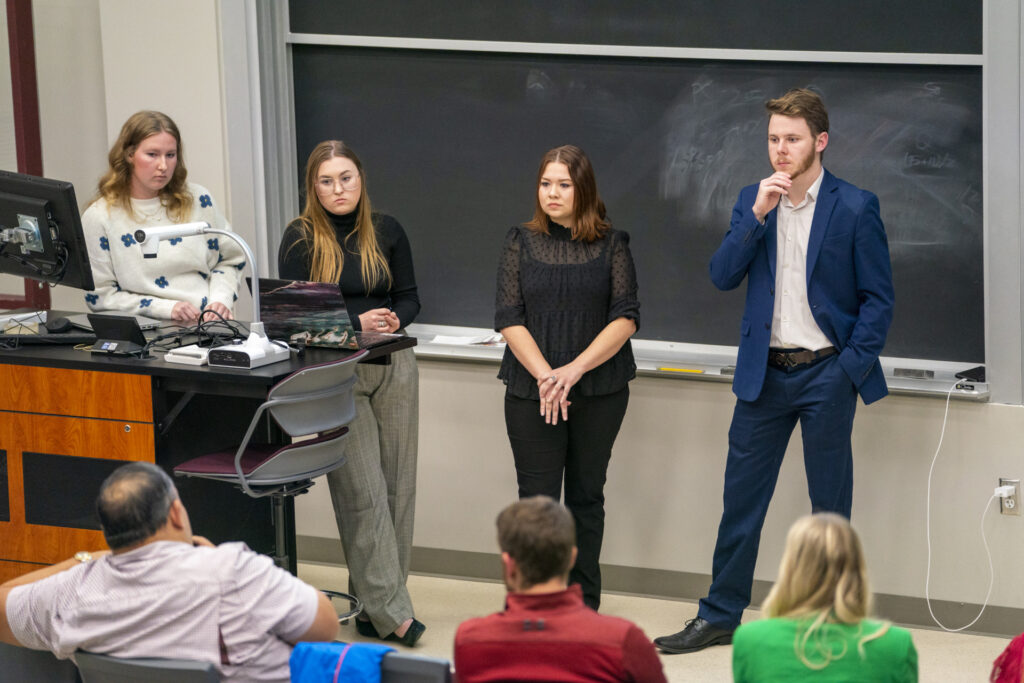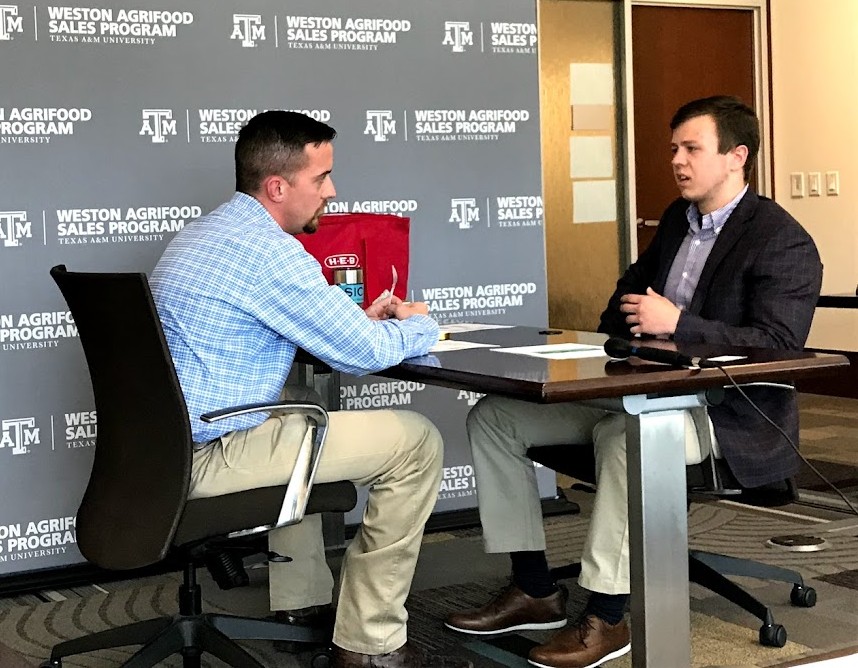Texas A&M agribusiness, agricultural economics programs receive top rankings
In its 100th year, agribusiness department ranks first in Texas, second in nation

Students inclined toward studying agricultural economics or agribusiness and looking for a strong education that will yield higher dividends upon graduation would do well to look at Texas A&M University at Bryan-College Station, according to recent national rankings.
This year, Texas A&M’s Department of Agricultural Economics in the College of Agriculture and Life Sciences is marking its 100th anniversary. It is also celebrating the fact that three separate and independent entities that rank institutions of higher learning based on a wide range of criteria have placed it among the nation’s top choices.
About the Department of Agricultural Economics
The Department of Agricultural Economics is renowned for training high-caliber students in high-demand degrees and programs. Students go on to pursue careers in industry, government, the private sector and other areas. The program allows them to gain knowledge and skills to apply to environmental and public policy issues, marketing and sales, entrepreneurship, finance, real estate and agribusiness.
“This year marks the centennial of the establishment of the Department of Agricultural Economics,” said Rudy Nayga, Ph.D., department head. “For a century, we have been providing agricultural economics and business education to students throughout Texas, the U.S. and the world, earning an international reputation for the quality of our curriculum and instructors.”
Nayga said while the program’s longevity and quality speak for themselves, the objective data accumulated and analyzed by independent ranking firms “leaves no doubt” that students looking for a career in agricultural economics and agribusiness would benefit from attending Texas A&M.
He said what sets Texas A&M’s agricultural economics and agribusiness program apart from other programs is its commitment to providing personalized attention to its students.
“We offer a number of options to study within the department, and in each, our priority is to provide individualized support through a highly dedicated teaching faculty supported by competent and caring staff and student advisers,” Nayga said. “This way, the students get the most from their learning experience – both inside and outside the classroom.”



Rankings and ranking methodology
In College Factual’s most recent rankings for the best schools for agricultural business majors, Texas A&M ranked No. 2 in the nation and No. 1 in Texas.
Rankings were based on essential information about the program, including gender and number of graduates, the average salary of those graduating, student debt and other factors.

During the 2020-2021 academic year, more than 570 students earned agricultural economics or agribusiness undergraduate degrees from Texas A&M. As a result, College Factual ranked the program first in popularity and first for agribusiness/agricultural business operations among all U.S. colleges and universities offering such degrees.
Students earned 505 bachelor’s degrees in agricultural economics and business, representing an 11% increase over the previous year’s total of 455. In 2021, 25 students earned a master’s degree, and 10 earned a doctoral degree.
Of the bachelor’s degree recipients, about 38% were women and 62% were men. For master’s degree recipients, 52% were women and 48% were men.
College Factual data also showed that those obtaining a bachelor’s degree in agricultural economics or agribusiness from Texas A&M typically earned almost $4,000 more annually in early career earnings than their peers nationally.
“This is an especially important aspect of the ranking as it reflects the actual monetary value of earning a bachelor’s degree from our agricultural economics and agribusiness program,” Nayga said.
Universities.com, which also provides ratings for institutions of higher learning, also ranked Texas A&M second in its listing of Best Agricultural Economics colleges in the U.S. for 2023. Some of their ranking criteria included career preparation, students and culture, facilities, and activities and groups.
Texas A&M’s Master of Agribusiness program, which is now in its 25th year, also received a high rating. Eduniversal recently ranked the program No. 1 in the nation and third in the world in Agribusiness/Food Industry Management masters’ programs. The program has been consistently ranked No. 1 in the nation by Eduniversal since 2018.

Some factors used in the ranking methodology include the programs’s reputation, student satisfaction and the salary of first employment. Additional points are given based on those with different nationalities registered, the number of graduates who do an internship or work abroad, student work experience and the availability of distance learning.
“The agribusiness faculty is a truly interdisciplinary team committed to excellent teaching, and it shows in the caliber of graduates,” said Victoria Salin, Ph.D., professor and director of the Master of Agribusiness program at Texas A&M. “Our faculty believe in applied economics as the core and provide students with an educational tool kit that rivals any other degree.”
She said agribusiness grads “hit the ground running” and bring ideas and applicable skills to the management challenges that continue to evolve in the food, feed and fiber businesses.
“For this Eduniversal ranking, input from students and stakeholders in the private sector is a plus,” Salin said. “It’s no surprise former Aggies gave positive feedback to the rating agency. And it’s also no surprise managers are so pleased with the qualifications of our interns and new hires.”
Specialized agricultural economics programs
The Department of Agricultural Economics also offers specialized, tailored programs to provide students with more opportunities to excel academically and grow professionally.
“The department is also home to renowned programs like the Weston AgriFood Sales Program and the Dianne and M. Edward Rister ’74 Agribusiness Entrepreneurship Program,” Nayga said. “In these programs, students participate in hands-on learning and skill-based training in industry best practices. They also connect with leading experts in their respective fields so they may learn from them and begin building their own professional network.”

He said the department is also home to the Financial Planning Program, which now offers a financial planning minor and will soon offer a bachelor’s degree.
“We recently received approval from the Texas Higher Education Coordinating Board to create a Bachelor of Science degree program in financial planning that will be initiated as of Aug. 15,” Nayga said.
This will be the first degree from Texas A&M that focuses specifically on holistic financial planning, said Nathan Harness, Ph.D., an instructional associate professor in the Department of Agricultural Economics and director of financial planning.
“This holistic approach in the Financial Planning Program will include managing household short- and long-term financial goals across areas such as risk management, insurance, investments, retirement, household taxation, estate and retirement planning,” Harness said. “Financial planning is a growing field, with the Texas Workforce Commission anticipating a 25.3% increase between 2018 and 2028. And according to the U.S. Bureau of Labor Statistics, the average first five year’s pay for financial advisors is more than $69,000 annually.”
The Department of Agricultural Economics has also selected a key group of professors to teach agricultural economics at the Texas A&M University Higher Education Center at McAllen as a means of helping meet the needs and address the challenges of agriculture and agribusiness in the Rio Grande Valley.
“Our agricultural economics programs have grown, developed and evolved over the years, but what hasn’t changed is our commitment to student success by providing the best possible education while thoroughly preparing our students to enter the real world,” Nayga said.


